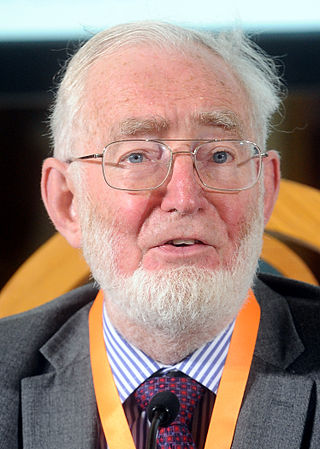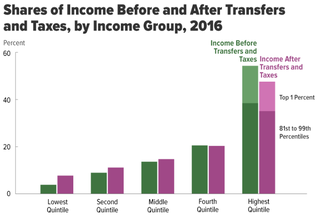
Economic growth can be defined as the increase or improvement in the inflation-adjusted market value of the goods and services produced by an economy in a financial year. Statisticians conventionally measure such growth as the percent rate of increase in the real and nominal gross domestic product (GDP).

Economic inequality is an umbrella term for a) income inequality or distribution of income, b) wealth inequality or distribution of wealth, and c) consumption inequality. Each of these can be measured between two or more nations, within a single nation, or between and within sub-populations.

Sir Angus Stewart Deaton is a British-American economist and academic. Deaton is currently a Senior Scholar and the Dwight D. Eisenhower Professor of Economics and International Affairs Emeritus at the Princeton School of Public and International Affairs and the Economics Department at Princeton University. His research focuses primarily on poverty, inequality, health, wellbeing, and economic development.

Sir Anthony Barnes Atkinson was a British economist, Centennial Professor at the London School of Economics, and senior research fellow of Nuffield College, Oxford.

Economic Freedom of the World is an annual survey published by the Fraser Institute, a Canadian think tank. The survey attempts to measure the degree of economic freedom in the world's nations. It has been used in peer-reviewed studies, some of which have found a range of beneficial effects of more economic freedom.

Social Problems is the official publication of the Society for the Study of Social Problems. Social Problems are universal in nature, but their intensity and type change from society to society. Social problems are socially relative. It is a quarterly peer-reviewed journal published by Oxford University Press since 2015 and formerly published by University of California Press. It was established in 1953. Some of the areas covered by the journal include conflict, social action, and change; crime and juvenile delinquency; drinking and drugs; health, health policy, and health services; mental health; poverty, class, and inequality; racial and ethnic minorities; sexual behavior, politics, and communities; and youth, aging, and the life course. The journal is co-edited by Annulla Linders and Earl Wright II.

Philip Geoffrey Alston is an Australian international law scholar and human rights practitioner. He is John Norton Pomeroy Professor of Law at New York University School of Law, and co-chair of the law school's Center for Human Rights and Global Justice. In human rights law, Alston has held a range of senior UN appointments for over two decades, including United Nations Special Rapporteur on extrajudicial, summary or arbitrary executions, a position he held from August 2004 to July 2010, and UN Special Rapporteur on extreme poverty and human rights from 2014-2020.

Income inequality has fluctuated considerably in the United States since measurements began around 1915, moving in an arc between peaks in the 1920s and 2000s, with a 30-year period of relatively lower inequality between 1950 and 1980.

Social inequality occurs when resources within a society are distributed unevenly, often as a result of inequitable allocation practices that create distinct unequal patterns based on socially defined categories of people. Differences in accessing social goods within society are influenced by factors like power, religion, kinship, prestige, race, ethnicity, gender, age, sexual orientation, intelligence and class. Social inequality usually implies the lack of equality of outcome, but may alternatively be conceptualized as a lack of equality in access to opportunity.

The inequality of wealth has substantially increased in the United States in recent decades. Wealth commonly includes the values of any homes, automobiles, personal valuables, businesses, savings, and investments, as well as any associated debts.
Gender inequality is the social phenomenon in which people are not treated equally on the basis of gender. This inequality can be caused by gender discrimination or sexism. The treatment may arise from distinctions regarding biology, psychology, or cultural norms prevalent in the society. Some of these distinctions are empirically grounded, while others appear to be social constructs. While current policies around the world cause inequality among individuals, it is women who are most affected. Gender inequality weakens women in many areas such as health, education, and business life. Studies show the different experiences of genders across many domains including education, life expectancy, personality, interests, family life, careers, and political affiliation. Gender inequality is experienced differently across different cultures.
Redistribution of income and wealth is the transfer of income and wealth from some individuals to others through a social mechanism such as taxation, welfare, public services, land reform, monetary policies, confiscation, divorce or tort law. The term typically refers to redistribution on an economy-wide basis rather than between selected individuals.

Thomas Piketty is a French economist who is a professor of economics at the School for Advanced Studies in the Social Sciences, associate chair at the Paris School of Economics and Centennial Professor of Economics in the International Inequalities Institute at the London School of Economics.

Socioeconomic mobility in the United States refers to the upward or downward movement of Americans from one social class or economic level to another, through job changes, inheritance, marriage, connections, tax changes, innovation, illegal activities, hard work, lobbying, luck, health changes or other factors.

William A. "Sandy" Darity Jr. is an American economist and social scientist at Duke University. Darity's research spans economic history, development economics, economic psychology, and the history of economic thought, but most of his research is devoted to group-based inequality, especially with respect to race and ethnicity. His 2005 paper in the Journal of Economics and Finance established Darity as the 'founder of stratification economics.' His varied research interests have also included the trans-Atlantic slave trade, African American reparations and the economics of black reparations, and social and economic policies that affect inequities by race and ethnicity. For the latter, he has been described as "perhaps the country’s leading scholar on the economics of racial inequality."
Frontiers: A Journal of Women Studies is a triannual peer-reviewed academic journal which figures among the earliest publications in the field of feminist and gender studies in the United States. First published in 1975, at the University of Colorado, Boulder, Frontiers takes pride in its extensive, interdisciplinary agenda concerned with the intersections of the different systems of oppression that produce and reproduce social inequalities and injustices.

David H. Autor is an American economist, public policy scholar, and professor of economics at the Massachusetts Institute of Technology (MIT), where he also acts as co-director of the School Effectiveness and Inequality Initiative. Although Autor has contributed to a variety of fields in economics his research generally focuses on topics from labor economics.

Max Roser is an economist and philosopher who focuses on large global problems such as poverty, disease, hunger, climate change, war, existential risks, and inequality.
Leslie McCall is an American sociologist and political scientist. She is a Presidential Professor of political science and sociology at the Graduate Center, CUNY, and the Associate Director of the Stone Center on Socio-Economic Inequality there. She studies wealth and social inequality in American society, as well as opinions about inequality, from an intersectional perspective.














